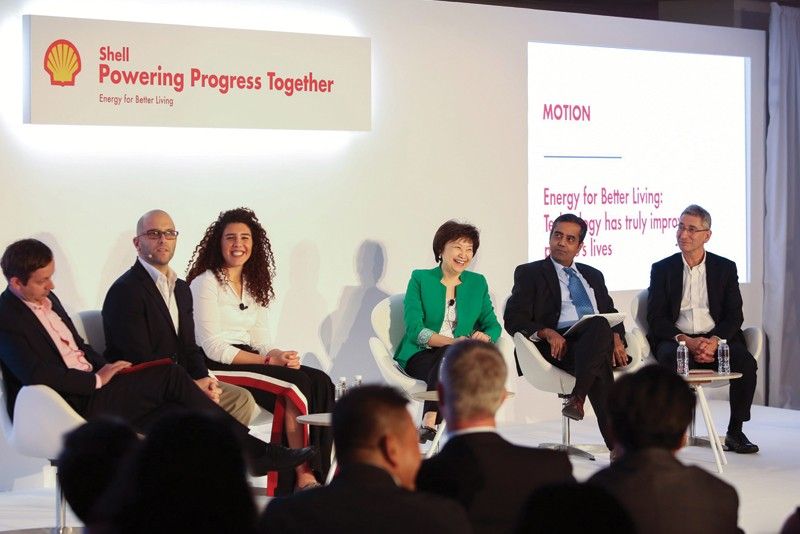Shell forum predicts Asia’s energy future

MANILA, Philippines — It’s been two years since the Philippines hosted the Shell Powering Progress Together (PPT) Forum and Shell Eco-marathon Asia, but both events still have the capacity to make Pinoys think — and hopefully, take action.
The latest PPTs and Shell Eco-marathons have been held in Singapore, a close neighbor of the Philippines but one of the most progressive countries in the world and the most expensive place to live in, a rank that has remained unchanged over the past four years, according to The Economist Intelligence Unit.
At the recent event, over 150 participants from all over the world convened in the Changi Exhibition Center to mull over this year’s PPT theme, “Energy for Better Living.”
The disparity of the two countries’ economic and energy-policy standings doesn’t mean the topic was less relevant, however. If anything, it made it even more significant, as experts from Shell put it: “Society faces a dual challenge: how to manage greenhouse gas emissions while extending the economic and social benefits of energy to everyone on the planet. In Asia, where economic progress and rapid urbanization are leading to increased energy demand, the challenge is particularly acute.”
Mallika Ishwaran, Shell’s senior economist and energy policy advisor, informed the audience that 66 percent of energy worldwide is consumed by cities. By the middle of this century, that number will rise to 80 percent. “A city of one million will be added every week by 2040,” she said. “A lot of this will be in the developing countries, the Indias and Chinas of the world.”
She notes that these places that will experience mass urbanization are also places where sustainable development is needed. This impending boom also provides businesses chances to “innovate and provide solutions that allow the standards of living and energy consumption to grow while respecting the environment.”
The challenge, therefore, she said, includes how to produce more energy to meet that demand, and how to use the kinds of energy that power buildings, manufacturing, and transport. “Each have different energy solutions —renewables, nuclear, carbon,” she added. The challenges also lie in the quality of the energy supplied.
Predictions for the Philippines
To add the Philippine context to this topic, it would be wise to consider insights from local sources.
One authority on urban planning who declined to be named opines on the general urban landscape: “I’m an optimist on how Metro Manila will look by 2050, though it’s hard to be one right now. On one hand, I see more and more appreciation for compact living. The state of Metro Manila traffic is making people want communities designed to have everything within reach. Unfortunately, unless the public transport sector and accessibility of affordable housing don’t radically change in the next 10 years, 2050 Metro Manila could just be an agglomeration of isolated islands of mixed-use communities served by P2P transport.”
The traffic and congestion that Metro Manila has come to be known for weighs heavily on the Filipino, and affects “investability, connectivity, and resiliency”— three aspects of development that the government is keen on providing solutions for. AECOM vice president Sylvester Wong said in an interview for BCDA’s New Clark City magazine, “Infrastructure is what’s really needed.”
Eighty percent of the whole country’s services flow from Metro Manila. Studies report that P3 billion is lost daily because of Metro Manila traffic. “Congestion brings food security issues, wellness issues, energy crises. Add this to how new economies are changing commute patterns and the way people occupy space, and inevitably, the costs and risks of living and doing business in this part of the Philippines increase to almost unbearable levels.”
Infrastructure creates connectivity, and sustainable development is needed to power growth in a healthy way for people and the environment.
Anna Marie Gonzales, head of sustainability at Ayala Land, Inc. and Hubert Humphrey, fellow for Urban and Regional Planning at Rutgers University, chimes in on the prediction for energy needs: “I think the current painful experience of living in Metro Manila will hopefully push its citizens to be more mindful of resources. Today’s twenty-somethings, who will be running the country in 2050, have a better grasp of ecology and the limits of the planet than their grandparents. At some point in the near future, renewable energy will cease to be a good-to-have and become a must-have.”
Will cars be irrelevant in 30 years?
In a recap of the predictions and ensuing conversations discussed during the PPT event, business consultant Dawn Yip summarized: “What came out as irrelevant in the next 30 years are: cars, organized schooling, anything that is retailed in brick and mortar, and jobs that are replaceable by algorithms. What will thrive are jobs that rely on AI, VI, and VR; work that relies on extreme customization or human care; the sharing economy; barter economy; and mining outer space for minerals or products.”
The uncertainties, she noted, were all rooted in business models. “On one hand, large, centralized business models, and on the other hand, you have the desire for diverse and decentralized business models.”
The ambiguous points lie in “tech that is constrained over concerns of privacy and restriction of choice, and on the other hand, greater acceptance of tech, as people are prepared to sacrifice some degree of privacy because of the flexibility and choices that we have.”
These questions were left in the minds of the audiences: “What are the roles that governments will play in the future of business considering the need for sustainability, and will there even be energy available? Will there be a scarcity of energy, or more accessibility?”
Students, business leaders, entrepreneurs, government officials — even regular citizens not in that room that day — would do well to mull over these questions as well. As one participant in the Shell PPT said, “Remember, these predictions aren’t prophecies, but possibilities.”
Indeed, all possibilities for a better future.



















